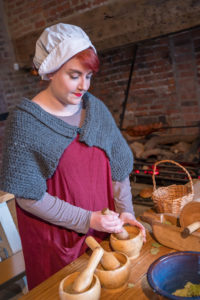Ordsall Hall: Our Lockdown Learning Journey
by Naomi Lewis, Libraries & Heritage Development Manager – Children, Families and Schools, Salford Museum and Art Gallery & Ordsall Hall
My small team and I were furloughed from early April until July. Returning, blinking, back into work (albeit remotely), our first job was to send out a survey to all the teachers who have visited our museums over the past few years or taken part in our CPD sessions or Teacher Forum. We also sent the survey to schools from across Greater Manchester. We wanted to find out where they were up to, what their priorities were and how we could support them. We asked about the conditions under which they would be happy to book a physical visit to us, what their focus was, and what kind of activities, sessions and support they would find useful, whether in the museums or in the classroom, listing these from very useful to not at all useful. We didn’t get loads of responses (around 20) but it allowed us to prioritise our work plan. A surprising number of schools said they would come to us for a visit with the right conditions in place, and since the survey went out and schools have returned, it seems like teachers are more confident with operating within class bubbles or year group bubbles.
We started the process of adapting our on-site schools offer by liaising closely with operational staff. Both our sites are open to the public on a pre-booked basis, and as these public slots have been quieter since the end of school holidays, site staff agreed that schools could fill slots, thereby meaning they were the only visitors on site. This was one of the key areas teachers mentioned as a condition for visiting. We agreed that this way of booking would only be on certain days or parts of the day, to give the general public opportunity to visit too, meaning availability for school visits is more limited than previously.
The process of altering our lesson plans for delivered sessions has been done collaboratively between Learning Officers and the Facilitators who deliver the sessions, given that it is them who will be spending the time with the classes, and them who have the in-depth first-hand experience. The key thing has been to keep the museum and its collections at the heart of the sessions, highlighting the benefit and experience of being in our spaces in person. We are in the process of sourcing multiple sets of handling objects we use during sessions, for example, Victorian washday possers and dolly tubs, so that small groups of learners can still get hands on without using the same objects as the Facilitator. These changes have been written up into revised lesson plans and will be sent to teachers ahead of their visits, so they can see the changes, the learning outcomes and our expectations of how school staff will be needed to support learning on the day. We are clear that it is teachers’ responsibility to make sure children maintain social distancing, and regularly wash or sanitise their hands.
We then risk assessed the school visit itself, and the activities making up the learning session, and will be making these available on our website in due course as advisory for teachers, to sit alongside their own risk assessments. Our site cleaning protocols will include areas used by the school during their visit, and we are looking into accessible ‘clear’ masks for facilitation staff to wear during delivery, although neither of these options really lends authenticity to in-character Victorian and Tudor delivery!
Most of all, we are clear that while we have tried to plan for every eventuality and question, we won’t have thought of everything, and are prepared to be flexible and go back to the drawing board, should elements not work well, or should local or national restrictions change, such as our very recent entry into Tier 3 in Greater Manchester. We’re planning a complimentary programme of classroom-based museum sessions for schools that don’t want to visit us yet, and it will be interesting to see how teachers choose to engage with these options as they navigate the curriculum over the next year.
We have a good number of school visits booked in for Autumn 2 already, and hope we can fill all our available slots, which are of course more limited than pre-lockdown. We have also been applying for funding to support wider plans to adapt our formal and informal learning offers, so watch this space so hear about further additions!
Compiled by GEM Volunteer Sonia Sharma


